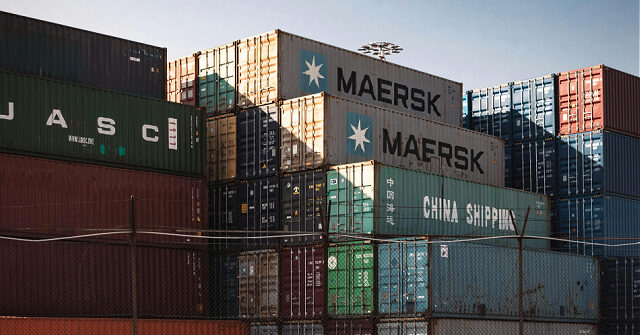A flourishing industry of “origin washing” services has appeared on Chinese social media, offering to help export companies evade U.S. tariffs by pretending their products were shipped from other Asian countries such as Vietnam and Thailand.
“The U.S. has imposed tariffs on Chinese products? Transit through Malaysia to ‘transform’ into Southeast Asian goods! The U.S. has set limits on Chinese wooden flooring and tableware? ‘Wash the origin’ in Malaysia for smooth customs clearance!” one such advertisement cajoled.
Radio Free Asia (RFA) on Tuesday broke down the business model for origin washing, which is more formally known as “freight forwarding.” The forwarding companies advertise extensively on Chinese social media platforms, including Douyin, China’s internal version of TikTok.
The ads promise to manage “customs declaration documents, clearance, and certificates of origin” to make it look as if Chinese shipments originated in other countries. If necessary, the forwarding companies will even move products between shipping containers to conceal their true origins.
Another tactic is to mix some high-priced items into large shipments of lower-value goods, then falsely claim the total value of the shipment is much lower than it really is, slipping it past customs officials who reserve their closest scrutiny for expensive items.
Some of the more aggressive origin-washing outfits promise “one-stop” service that can almost infallibly disguise the origin of shipments and shepherd illicit Chinese goods past U.S. customs inspectors.
According to RFA, there is some skepticism among Chinese social media users about these claims of perfect service, because artificial intelligence (AI) technology has made it easier for customs inspectors to monitor global shipping and spot false paperwork. The countries used to origin-wash Chinese exports take a dim view of the practice and have stepped up their efforts to catch fraudsters, especially Vietnam and South Korea.
“We are seeing a sharp increase in recent cases where our country is used as a bypass for products to avoid different tariffs and restrictions because of the U.S. government’s trade policy changes. We have found numerous cases where the origins of Chinese products were falsified as Korean,” South Korea’s customs agency said last month.
South Korean customs estimated the value of exports with falsified origins at $21 million for the first quarter of 2025. Almost all of those goods came from China and were bound for the United States.
University of South China professor Sun Kuo-Hsiang told RFA that Chinese companies were initially planning to skirt U.S. tariffs by moving their factories to other Southeast Asian countries, but this proved impractical, so origin washing became the preferred technique. Sun thought the practice posed a real challenge to U.S. and European officials due to the sheer volume of goods flowing out of China with sketchy paperwork.
Sarah Ou, a sales representative for a Chinese exporter called Baitai Lighting, told the Financial Times (FT) there was nothing wrong with origin washing as a means of evading unfairly high U.S. tariffs.
“The tariff is too high, but we can sell the goods to neighboring countries, and then the neighboring countries sell them on to the United States, and it will reduce,” she said.
Ou was not worried about getting caught, because most Chinese manufacturers have policies that state buyers are legally liable for the fate of shipments as soon as they leave Chinese ports.
“Customers only need to find ports in Guangzhou or Shenzhen, and as long as [the goods] go there, we have completed our mission . . . [after that] It’s none of our business,” she explained.
“Basically I only ship to a Chinese port and they take it from there,” the owner of another company said in a similar vein. This manufacturer said the cost of dependable origin washing services was a pittance, only about 70 cents per kilogram of freight, and the practice was so widespread that trade industry associations were helping their members get in touch with tariff evasion specialists.
FT talked to an origin-washing outfit that used Port Klang in Malaysia to launder its goods, ostensibly because port workers and factories in Malaysia were willing to move shipments between containers and issue false certificates of origin, and Malaysian authorities “are not very strict” about checking the paperwork.
Malaysian officials indignantly told FT they were “unequivocally committed to upholding the integrity of international trade practices,” so they viewed origin washing as a “serious offense.”
On the other end of the supply chain, some American businessmen told FT they were growing nervous about doing business with certain Chinese suppliers, because they feared entire shipments could be seized by U.S. Customs.
China’s discount retail giant Temu reportedly decided not to try origin washing, possibly because the huge volume of small parcels shipped by Temu would be very difficult to launder through foreign ports without drawing attention.
CNBC reported last week that Temu is considering a different strategy to get around Trump’s tariffs – forming partnerships with “local sellers” in the U.S. who can fulfill orders for Temu products “from within the country.” Temu’s previous strategy of passing tariff increases along to their customers was killing the business, since the tariffs could more than double the cost of Temu’s discount merchandise.
Read the full article here


